Any enterprises are prohibited from restraining competition in conjunction with other enterprises.
There are many cases where several enterprises execute agreements for product prices and volumes in order to protect mutual interests, thus voluntarily restraining market competition. The Antimonopoly Act prohibits any artificial competition-restricting conducts such as cartels and bid riggings.Prohibition of cartels
If any enterprises or any enterprises as constituent members of trade associations consult with each other to jointly determine product prices, sales and production volumes, etc., which should be determined voluntarily by each enterprises, and restrain competition as the result, such conducts are regarded as “cartels,” and prohibited. Such arrangements, whether by gentlemen’s agreements, by word of mouth or any other forms, are regarded as “cartels,” if some kind of arrangements exist among these enterprises, and if they eventually take a concerted action.
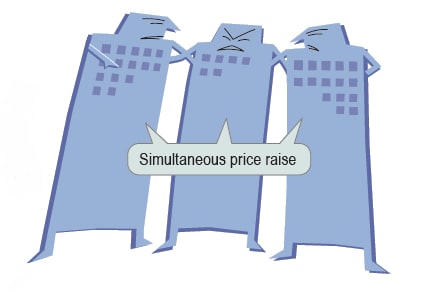
Prohibition of bid riggings
“Bid rigging”means that several enterprises participating in bidding for e.g. public works of the central and local governments and public procurement consult with each other in advance to determine the contractors and contract prices, and is prohibited as one of the unreasonable
restraint trade.
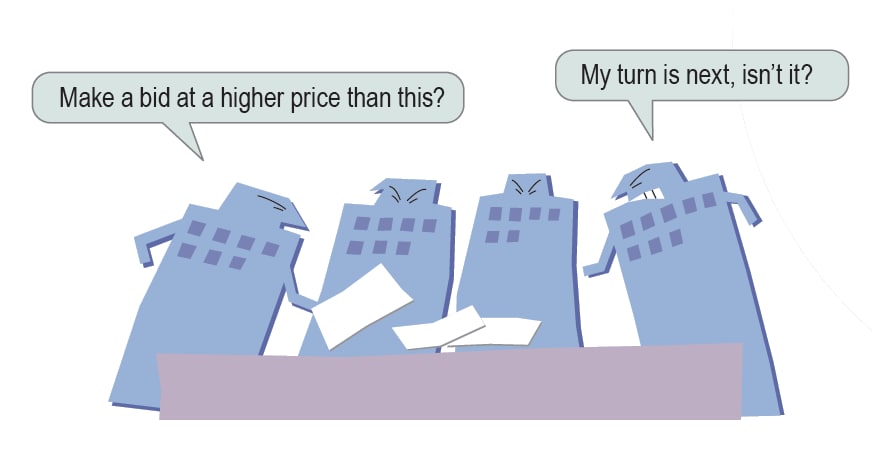
Prohibition of participation in international cartels
It is unlawful and prohibited to conclude agreements for cartels with overseas enterprises in the same trade. For instance, if domestic and overseas enterprises form a cartel whereby they do not export their respective products to their respective partner countries, it follows that such products are not imported into the domestic market. This case falls under an illegal conduct given a substantial restraint of competition.
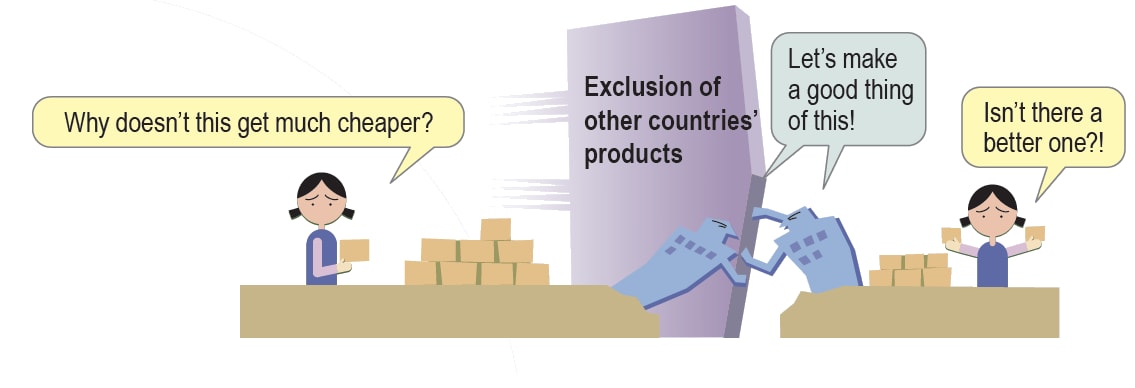
Restraint of activities by trade associations
Trade associations are prohibited from performing such conducts as unjustly restrain voluntary business activities of enterprises by Price raises, limiting the number of enterprises in a particular field of trade and giving instructions as to price raises, volume restraint, transaction partners, and allocation of sales territories.
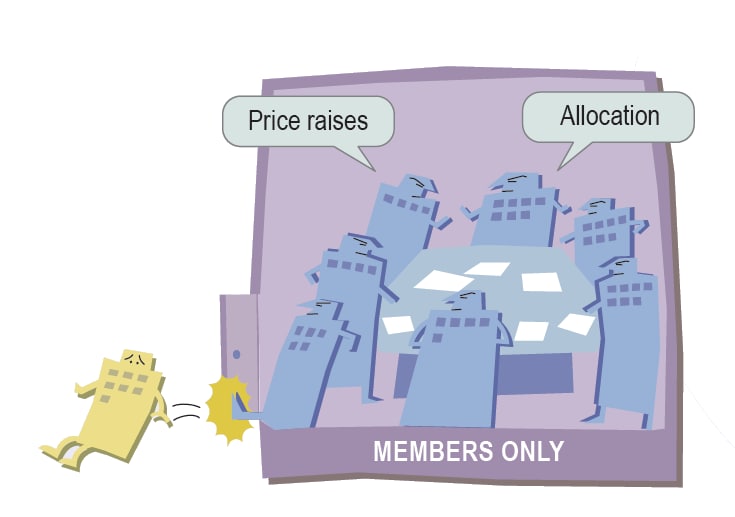
Cartel exemptions from the application of the Antimonopoly Act
In order to achieve specific policy objectives, c artels may be allowed e xceptionally under certain requirements in accordance with the Antimonopoly Act and other laws. For instance, joint economic business by those associations aimed at mutual aid of small-scale enterprises and consumers is exempted from the application of prohibition of the Antimonopoly Act.
ーーーーーーーーーーーーーーーーーーーーーーーーーーーーーーーーーーーーーーーーーーーーーーーーーーーーーーーーーーーーーーー
Any conducts to monopolize the market are prohibited.
The monopolistic or oligopolistic market under the control of only a few enterprises makes it difficult for competition to function effectively. The Antimonopoly Act applies various regulations to conducts intended to monopolize the market and maintain oligopolistic situations by undue means.
Prohibition of private monopolization
If any enterprises try to exclude competitors from the market individually or by combination with other enterprises by means of unjust low-price sales, discriminatory prices, etc. or monopolize the market by obstructing business activities of new entrants, such conducts are prohibited as “private monopolization (exclusion type)". Moreover, if any dominant enterprises try to control the market by restraining business activities of other enterprises through the acquisition of stock, dispatch of officers, etc., such conducts are also prohibited as “private monopolization (control type)”.
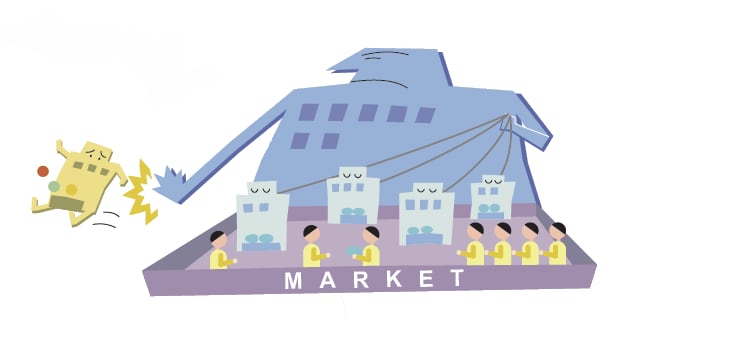
ーーーーーーーーーーーーーーーーーーーーーーーーーーーーーーーーーーーーーーーーーーーーーーーーーーーーーーーーーーーーーーーー
Measures against monopolistic situations
If competition fails to function effectively in a certain industry with a monopolistic situation because some dominant enterprises engage in large-scale operations, the JFTC may regard such a case as monopolistic situation, and take measures to restore competition. In such a case, the JFTC may request such enterprises to transfer a part of their business operations, as necessary.
ーーーーーーーーーーーーーーーーーーーーーーーーーーーーーーーーーーーーーーーーーーーーーーーーーーーーーーーーーーーーーーー
Any conducts likely to impede fair competition in a market are prohibited.
In order to revitalize the market, it is necessary for enterprises to engage in fair competition in an effort to offer products which are better in quality and lower in prices than those of their competitors. For this purpose, the Antimonopoly Act designates the conducts restraining free competition and undermining the foundation for competition as “unfair trade practices,” and prohibits such conducts. “Unfair trade practices” consist of “general designation” applicable to the entire category of business and“Special designation” applicable only to specific category of business; specific categories are as follows; newspaper, distribution of goods and large-scale retailer.
General designation
Refusal to deal
It is unlawful and prohibited that several enterprises jointly refuse to do business with specific enterprises or cause the third party to do so. For example, if several enterprises jointly force raw material manufacturers not to supply products to new entrants to the market with intent to prevent such new entrants from launching their operations, this falls under refusal to deal. Refusal to deal on an individual basis is also deemed unlawful, if deals are refused as a means of achieving an unjust purpose in terms of the Antimonopoly Act, such as making retailers abide by sales prices.

Discriminatory pricing and discriminatory treatment
It is unlawful and prohibited to set unjustly different prices and transaction terms for the same
products or services depending on transaction partners and sales territories. For instance, if dominant enterprises offer lower prices only to the customers of competitors in order to exclude them, and take an excessive dumping means only in the area competing with their competitors, such conducts falls under this case.
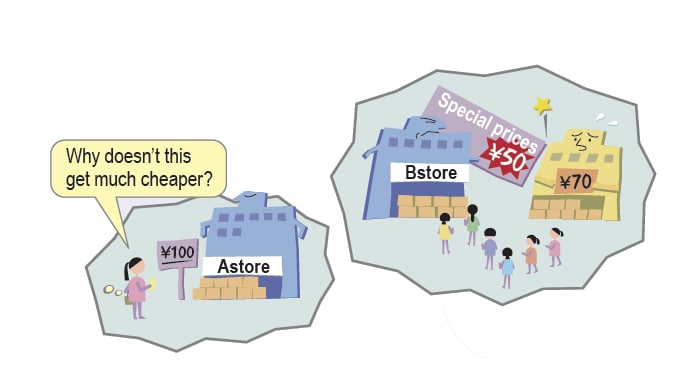
Unjust low price sales
It is unlawful and prohibited to sell products or services at unjustly low prices, for example, sell continuously at prices sizably lower than seller’s actual purchase prices if such sales make it difficult for competitors to carry out business activities. However, it is lawful and justified to make bargain sales as fair competition means and dispose of perishable or seasonal products at special prices.
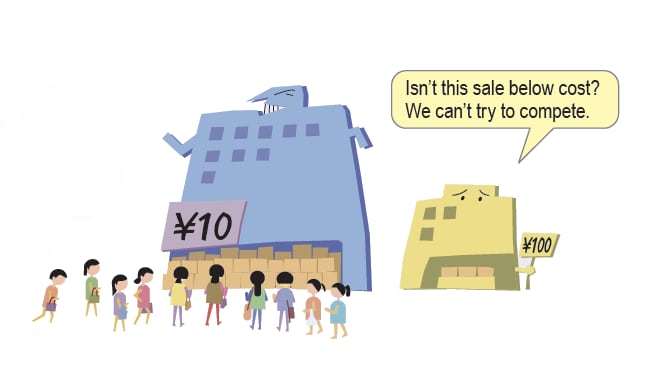
Deceptive customer inducement
It is unlawful and prohibited to attract customers unjustly through deceptive and extravagant advertisements with intent to disguise own products or services as extremely superior to those of competitors, and sell them by attaching excessive premiums because such conducts distort the proper selection of products or services by customers.
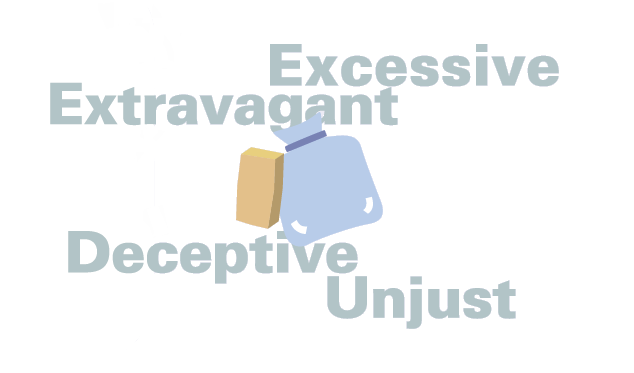
Unjust high price purchasing
It is unlawful and prohibited to purchase what competitors need at prices extremely higher than the market prices in order to exclude them from the market by making it difficult for such competitors to procure necessary products or services. For instance, buying up raw materials indispensable to products of competitors at extremely high prices falls under this case.
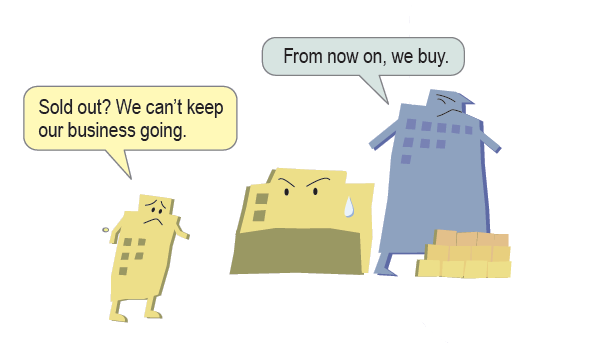
Tie-in sales
It is unlawful and prohibited to force transaction partners to purchase products or services by tying them to the supply of other products or services. For instance, forcing purchasers to
buy a combination of popular products and unsold unpopular ones against their will falls under this case.
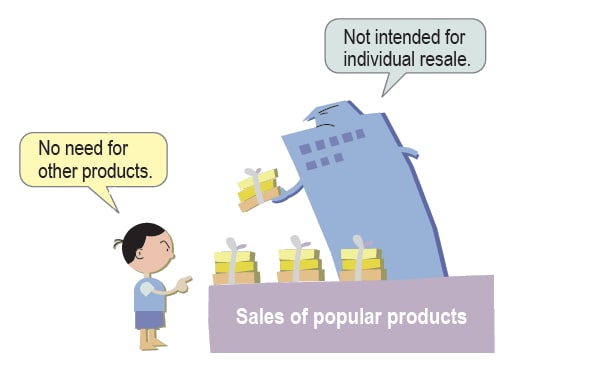
Abuse of superior bargaining position
It is unlawful and prohibited by the Antimonopoly Act for enterprises in superior bargaining position to make use of such position to impose disadvantage on the transacting party, unjustly in light of normal business practices. Various conducts are prescribed in the Antimonopoly Act; such as forced purchase and use, request for the payment of monetary contribution, refusal to receive goods,return of goods, and delay in payment.
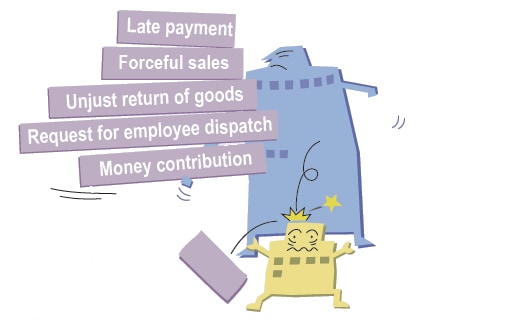
Resale price maintenance
It is prohibited, in principle, to give retailers, etc. instructions on sales prices because it restricts prices as a basic means of competition. It is also prohibited to impose economic disadvantage on retailers and suspend delivery to them in order to force them to sell products or services at designated prices.
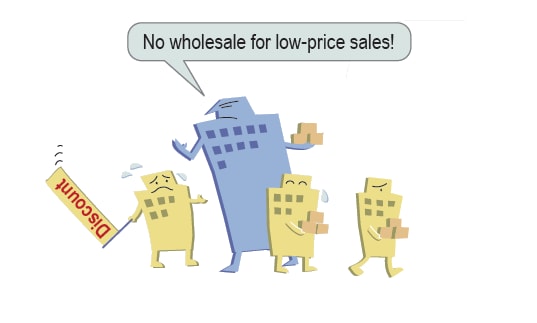
Dealing on exclusive terms
If exclusive dealing, which makes transaction partners handle only one’s own products or services, and prohibits dealing with other competitors, has the possibility of depriving competitors of trade opportunities and distribution routes and hindering new entry, such conduct would be unlawful.
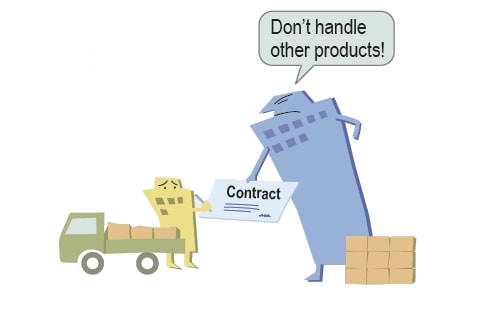
Dealing on restrictive terms
Carrying out trade on terms that unjustly restrict business activities of transaction partners is prohibited. Restriction of sales territories under the territory system and sales methods such as low-price sales falls under this case.

Interference with competitors' transactions
It is unlawful and prohibited to unjustly obstruct business activities of competitors by obstructing the conclusion of contracts necessary for carrying out business activities and by inducing the non-fulfillment of such contracts. For instance, if import agents handling overseas brand-name products request overseas sales outlets to discontinue transactions with other domestic import agents, it falls under this case.

Interference with internal operations of competitors
It is unlawful and prohibited to unjustly induce or abet the shareholders and officers of competitors to perform conducts detrimental to them.

| Unfair trade practices by trade associations Trade associations are prohibited from instructing their participating member enterprises to perform onducts falling under “unfair trade practices.” It is also prohibited to unjustly exclude those members not following such instructions from trade associations or make it difficult for such members to carry out business activities through discriminatory treatment. |
| International contracts and unfair trade practices Domestic enterprises are prohibited from concluding international contracts containing “unfair trade practices”with overseas enterprises. As to overseas areas where it is difficult to regulate unfair trade practices of overseas enterprises by the Antimonopoly Act, it is prohibited to conclude such international contracts. |
ーーーーーーーーーーーーーーーーーーーーーーーーーーーーーーーーーーーーーーーーーーーーーーーーーーーーーーーーーーーー
The Subcontract Act |
The JFTC regulates mergers and acquisitions which may restrain competition.
The Antimonopoly Act prohibits merger, division and acquisition of business etc. where the effect of such a merger and acquisition may substantially restrain competition. The JFTC announces“Guidelines to application of the Antimonopoly Act concerning review of business combination”to clarify what kind of merger and acquisition may raise problem. Moreover, the AMA prohibits establishment of a company which may cause excessive concentration of economic power, and restricts rate of holding voting rights by a bank or an insurance company.
Prohibition of particular mergers
Mergers are prohibited if they may cause a substantial restraint of competition in any particular field of trade. “Particular field of trade” is generally defined individually in accordance with the types of products or services handled by merged companies, geographical extent to which such products or services are traded, and the specific phase of transactions. The judgment on whether the effect of the merger may substantially restrain competition or not is made by comprehensively taking into account various factors such as market shares and status of import and entry in the market.
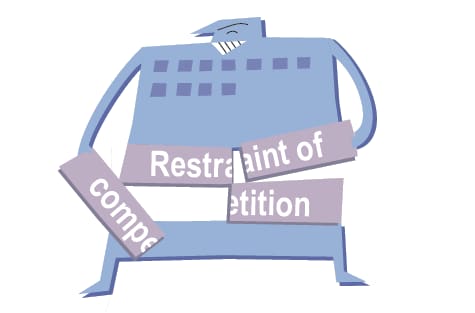
Prohibition of particular divisions
“Joint establishment division” in which several entrepreneurs jointly cause a new company to take over business operations and “acquisition division” in which an entrepreneur cause the existing company to take over business operations are treated in the same manner as mergers because a portion subject to division and takeover is taken over by the other company. Such division is prohibited if it substantially restrains competition in any particular field of trade.

Prohibition of particular acquisition of business
The acquisition of business among companies are treated in the same manner as mergers because the business of acquired company is combined with that of acquiring company, and is prohibited if it substantially restrains competition in any particular field of trade. The acquisition of business includes the acquisition of sales and plant operations, the acquisition of fixed assets used for business and the lease of business, etc.

Prohibition of particular stockholding
When one company holds stocks of another company, there arises a relation of business combination between them. Such stockholding is prohibited if it substantially restrains competition in any particular field of trade.
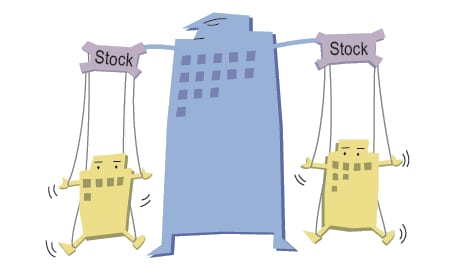
Prohibition of particular interlocking directorates
Interlocking directorates are prohibited if it substantially restrains competition in any particular field of trade by one person concurrently serving as officers of several companies.

Prohibition of establishment of company which may cause excessive concentration of economic power
The Antimonopoly Act prohibits the establishment of and transformation into a company which may cause excessive concentration of economic power. Since it is important to enhance the predictability of entrepreneurs and secure the ransparent operation of the Act, the JFTC announces “Guidelines Concerning Companies which Constitute Excessive Concentration of Economic Power” as a means of interpretation of what companies are prohibited as such.
Restriction on rate of holding voting rights by a bank or an insurance company
Banks or insurance companies are prohibited to hold more than 5% (10% in the case of insurance companies) of voting rights of non-financial companies in Japan.
However, they can hold more than 5% (10% in the case of insurance companies)when so approved by the JFTC or exceptionally permitted by law.
The JFTC announces “Guidelines concerning Authorization of Acquisition and Holding of Voting Rights by Banking and Insurance Companies under the Provision of Section 11 of the Antimonopoly Act” etc.







